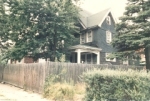
House, Haunted
Renovating a home doesn’t dispel its memories
Recently, New York City renewed its faltering attempts to crack down on illegally subdivided houses, those infamously overcrowded firetraps. We bought one years ago, and the news reports prompted my husband and me to wonder, again: What ever became of the Chang People?
They haunt us, those 20-odd Chinese immigrants whom we displaced when we bought a filthy, tumbledown boarding house in Flatbush. “Displaced” is the official word; in fact, they were thrown out of their wretched excuse for a home. Mr. Chang, the son of the deceased owner, was baffled that just one childless couple and an elderly parent were planning to inhabit this 16-room maze of peeling paint and flaking plaster. “You rent out every room, make lots of money!” he would shout at us.
As house-hunters in the mid-1980s, we had moved beyond sticker shock to shell shock: The best we could afford was a promising ruin. Pushed out of gentrifying neighborhoods into Brooklyn’s working-class realms, we found ourselves on a tour of dungeons and deathtraps; penurious by yuppie standards, we were now power brokers in the kingdom of the dispossessed. In one house, the basement was a pitch-black warren of crazily partitioned cells, occupied by lone figures on cots, lit by the flicker of tiny television sets. In another, a man camped out next to the furnace, hanging his meager wardrobe on the gas pipes. In yet another, the charming ladies who occupied a stifling, roach-ridden attic obligingly let us pick our way over their cots jammed underneath the rafters.
The denizens of Chang’s house lived in relative luxury. The old place had been carved up for transients at least two decades earlier, and had once been shabby but respectable. Most of the tenants had been teachers at a nearby private school. (One, “M. Ste. Marie,” taped her name to what is now my office closet door; I’ve left it there as a fond souvenir of the house’s slightly more genteel past.) Then, in the late 1970’s, a feisty old gentleman, rumored to have been a general in Chiang Kai Shek’s army, bought it as a cash cow, with his countrymen providing the milk.
Every tenant had a washbasin, towel rack, and two windows; every door bore the savage toothmarks of generations of locks and deadbolts. Wire and jacks for 17 separate phone lines snaked everywhere. In the one communal kitchen, as sticky as flypaper, each room had its own pathetic cup hook marked with a corresponding room number. Three restaurant refrigerators sucked current from a feeble extension cord that sizzled in the plug of a light socket. A single shower and two ghastly toilets served for all. The windows provided blessed light but no ventilation; they were taped shut and covered with accordion-style burglar gates, each padlocked. (The elder Mr. Chang, his son boasted, kept the keys under his pillow, along with his gun.)
During two brief tours before closing day, the tenants, to whom we never spoke, left an indelible impression. There was Newspaper Fellow, a little old man who sat chain-smoking amid waist-high piles of Chinese periodicals; Poster Guy, who festooned the walls of what is now our daughter’s nursery with Asian pin-ups; and The Monk, a studious-looking young man with a modest Buddhist shrine adorned with incense and oranges. Chang himself occupied a ground-floor apartment with his mother, sister and niece; I wondered how these, the only female occupants, managed somehow to emerge smartly dressed and freshly groomed from their shabby digs.
We never knew where any of them went, Chang included. None left a forwarding address. We saved their important-looking mail for years, including green cards, personal letters, and cemetery bills; a few tenants picked up a letter or two, but most of it went unclaimed. Old Chang’s widow came once, alone, and we gave her a tour of our renovations; she murmured wistfully in Chinese and dabbed her eyes. And countless times we noted careworn Asian passers-by stop and stare, then move on. Were they shuddering in relief at a closed chapter in their lives, or, now living in some fresh hell like a tenement basement, were they remembering the good old days when they had windows?
The debate over enforcement of building codes seems curiously academic to the people most closely affected by it. In reality, illegal subdivisions are morally ambiguous, a raw trade-off of safety and hygiene in return for shelter. Were the Chang people victims of their rogue landlord, or of us, or both? It cannot be a bad thing that we took a decaying house, one naptime cigarette away from a caged inferno, and began the still-unfinished task of turning it into a single, safe, and wholesome home. It cannot be a good thing that 20-odd people were scattered to the winds of hardship. If they ever think of us, the American couple who stood in their doorways and peered in at their rooms and their lives, I hope they do not hate us.